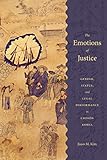The emotions of justice : gender, status, and legal performance in Chosŏn Korea / Jisoo M. Kim.
Material type: TextSeries: Publication details: Seattle : University of Washington Press, (c)2015.Description: 1 online resourceContent type:
TextSeries: Publication details: Seattle : University of Washington Press, (c)2015.Description: 1 online resourceContent type: - text
- computer
- online resource
- 9780295806174
- KPA120 .E468 2015
- COPYRIGHT NOT covered - Click this link to request copyright permission: https://lib.ciu.edu/copyright-request-form
| Item type | Current library | Collection | Call number | URL | Status | Date due | Barcode | |
|---|---|---|---|---|---|---|---|---|
 Online Book (LOGIN USING YOUR MY CIU LOGIN AND PASSWORD)
Online Book (LOGIN USING YOUR MY CIU LOGIN AND PASSWORD)
|
G. Allen Fleece Library ONLINE | Non-fiction | KPA120 (Browse shelf(Opens below)) | Link to resource | Available | ocn930269563 |
"The Chosŏn State (1392-1910) is typically portrayed as a rigid society because of its hereditary status system, slavery, and Confucian gender norms. However, The Emotions of Justice reveals a surprisingly complex picture of a judicial system that operated in a contradictory fashion by discriminating against subjects while simultaneously minimizing such discrimination. Jisoo Kim contends that the state's recognition of wŏn, or the sense of being wronged, permitted subjects of different genders or statuses to interact in the legal realm and in doing so illuminates the intersection of law, emotions, and gender in premodern Korea"--Publisher's website.
Includes bibliographies and index.
Author's note -- Kings of the Chosŏn Dynasty -- The Confucian state, law, and emotions -- Gender, writing, and legal performance -- Women's grievances and their gendered narrative of wŏn -- Seeking vindication or begging pardon on behalf of the living -- In search of justice on behalf of the dead.
COPYRIGHT NOT covered - Click this link to request copyright permission:
There are no comments on this title.
